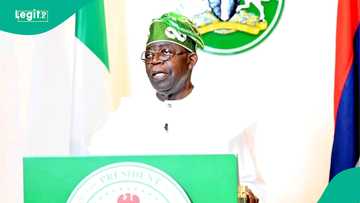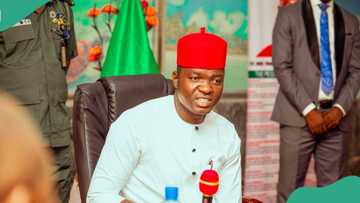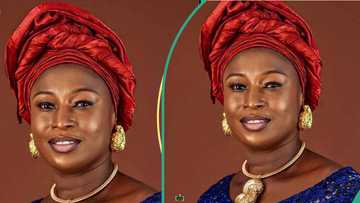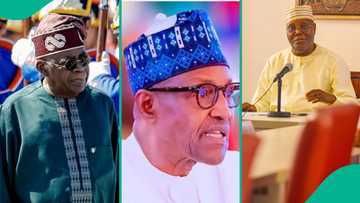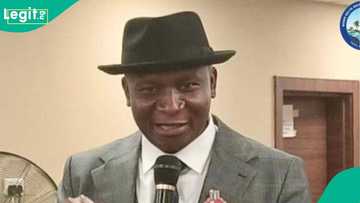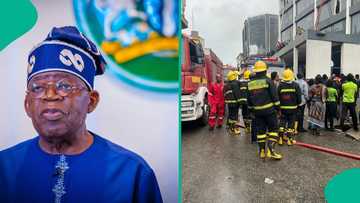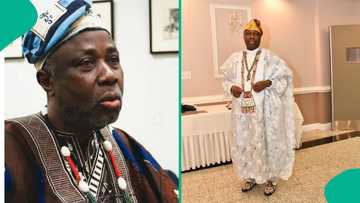Meet Okhesomi: OAU Medical Student and President of HEAL Society Who’s Driving Health Equity
- Okhesomi Eshemokhai, a final-year student of Medicine and Surgery at the Obafemi Awolowo University has shared her inspiring leadership journey online
- Okhesomi had emerged as the first National President of the Health Equity Accelerator Leadership (HEAL) Society
- This proactive student organisation aims to bridge health disparities through advocacy, research, and technology
A final-year medical student at Obafemi Awolowo University, Okhesomi Eshemokhai, has shared her journey as the first National President of the Health Equity Accelerator Leadership (HEAL) Society.
Okhesomi has done a great job in driving the organisation's mission to bridge health disparities through advocacy, research, and technology.
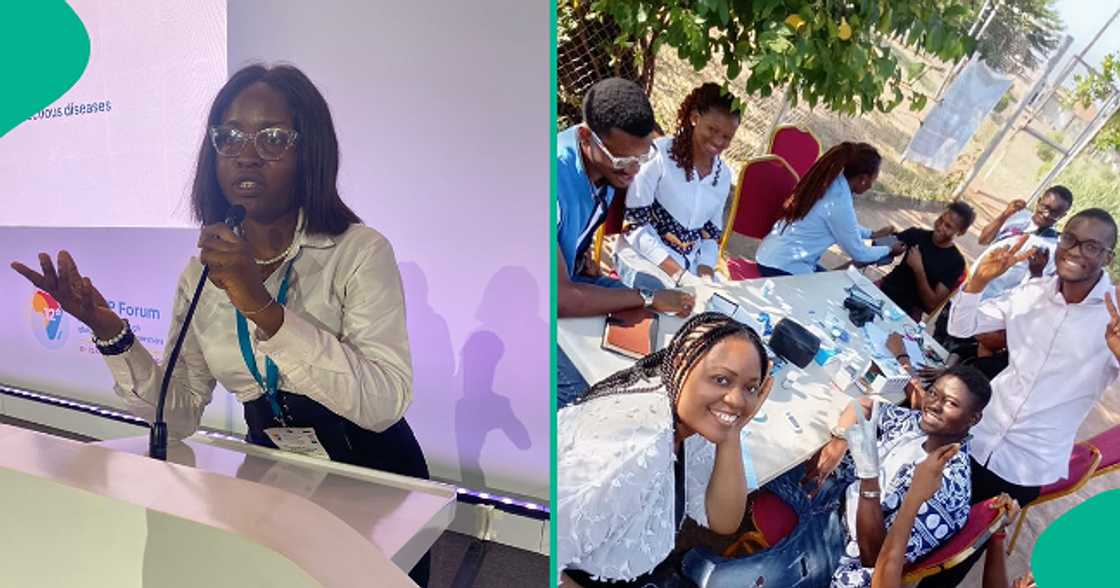
Source: Original
Legit.ng caught up with her to gain insights into her leadership journey and the strategies that helped her so far.
Becoming Pioneer President of HEAL Society
Okhesomi said her journey with the HEAL Society began when she submitted an application and was accepted as a fellow in October 2024.

Read also
Moniepoint unveils Victor Osimhen as brand ambassador, launches Monieball football 5-A-Side
She and another fellow, Aishat Olowoyeye, were tasked with starting the society at Obafemi Awolowo University, and they put out a call for interested members and appointed school executives.
In December, Okhesomi learned about the need for a National President to lead the newly formed society across various universities.
Despite preparing for her Part 5 Medical Board Exams, she saw this as an opportunity to shape the society's direction.
Okhesomi prepared a manifesto, contested in an election, and won the role.
As the Pioneer National President, Okhesomi recognised the responsibility that came with the role and was driven by the society's purpose to empower young leaders to advocate for health equity, improve lives through research, and drive positive change with technology and innovation.
"My HEAL society journey started in early October 2024 when I was accepted to be a fellow following my application and subsequently charged with the responsibility of starting the HEAL Society at my school, Obafemi Awolowo University. The HEAL Fellowship was organized by Dr Isaac Olufadewa, the Executive Director of Slum and Rural Health Initiative (SRHIN).
"There were about 40 of us Fellows from various universities but in my school two Fellows were selected, myself and a classmate Aishat Olowoyeye who also applied. We put out a call for interested members on some of our school whatsapp groups, appointed our school executives from those who indicated interest and got things started. It was a completely NEW club but many people didn't even know because we channeled all our prior leadership experience and most importantly, we put a lot of energy and drive into our members.
"We also got our society officially registered with our school DSA in record time which was no mean feat (if you know you know). Things were relatively easier then for me, I was just serving as the President at my school level while every month we had a Fellows Capacity building webinar with Dr Isaac Olufadewa alongside other Fellows who served as Presidents and Vice Presidents of the newly started societies in their schools. In December we were told there was a need for a leader among us Presidents who would serve as the first National President and host the first National secretariat.
"I was preparing for my Part 5 Medical Board Exams then but I saw it as an opportunity to not just to participate passively but to help in actively shaping something new. So I prepared my manifesto, contested against another Fellow, won the election and that was how I came into the role. For me, being the Pioneer National President was hardly about the title because I recognized the real responsibility from the onset; I was going to be building from scratch and I had to set a positive precedent for future leaders.
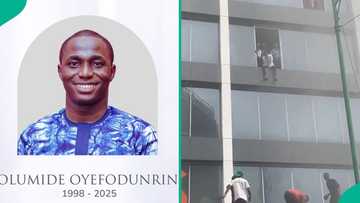
Read also
Last plan of man who died a day before his 27th birthday in Afriland Towers fire made public
"However, I was inspired by the purpose of the society which is to empower young leaders to advocate for health equity, improve lives through research, and drive positive change with technology and innovation for a healthier world, and I decided to take it a step further through active service."
Okhesomi's key goals as Pioneer National President
According to the trailblazer, her goals included capacity building for members, impactful health equity-focused programs, establishing a strong digital presence, and expanding the society's footprint. She also aimed to create sustainable systems that would outlast her tenure.
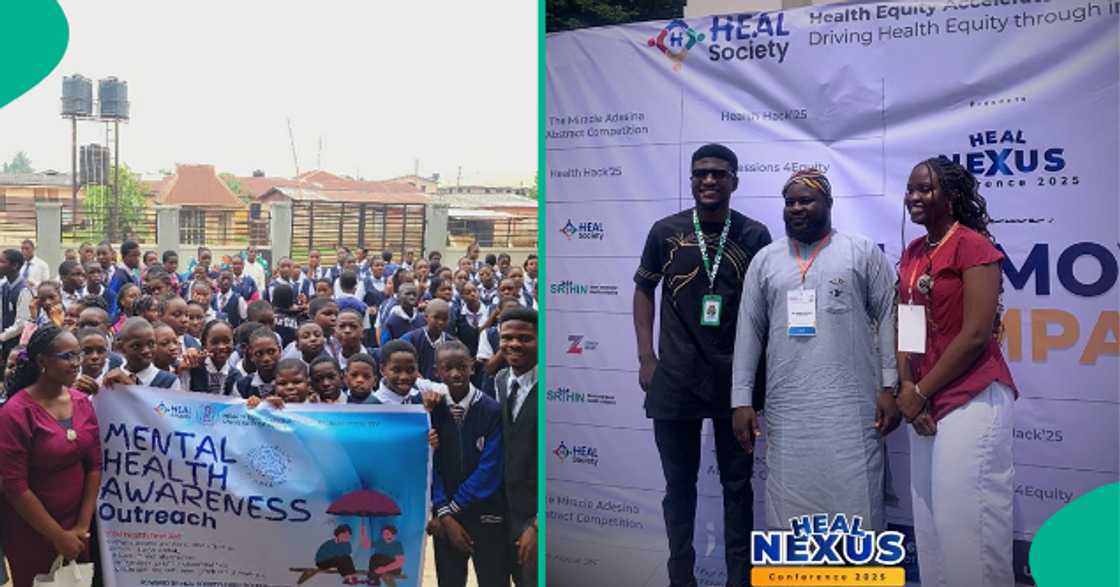
Source: Original
She noted that the monthly capacity-building meetings for the fellows certainly helped in instilling necessary skills in leaders.
For example, Okhesomi recounted that her society members successfully carried out a secondary school awareness outreach without her physical presence.
The society also achieved its goal of hosting the maiden national conference, HEAL Nexus, which featured practical sessions on research, advocacy, fundraising, research abstract presentations, and a hackathon competition.
Additionally, the society has expanded its footprint by launching more chapters, with members now present in 76 Nigerian higher institutions and one university in Kenya.
In her words:
"When I drew up a timeline of how I wanted my tenure to go, my goals were Capacity building for members, impactful health equity-focused programs for the general populace, establishing a strong digital presence for the society, and expanding our societies. Most importantly, I aimed to create sustainable systems that would outlast my tenure.
"The monthly capacity building meetings for fellows were helpful as they instilled necessary skills such as outreach planning skills, fundraising skills, etc in the leaders who could then translate it to their members. For instance, I wasn't even physically present for the first secondary school awareness outreach we organized in HEAL society OAU because my department was on holiday then, but my society members were able to carry it out successfully.
"Our just concluded maiden national conference, HEAL Nexus is another key goal we have achieved in just 9 months. HEAL Nexus held at the University of Ibadan earlier this month (September 4th-6th) and we had about 200 attendees physically and online and over 100 registered delegates from different schools in Nigeria including those in the East and South-South. It was a two day event where we had various practical sessions on research, advocacy, fundraising, with Research Abstract presentations and a Hackathon competition.
"At the start it seemed impossible for a completely new society, but we have not only achieved this for ourselves, we have set a precedent for the next set of leaders. We have also been able to grow our digital presence on LinkedIn and Twitter especially by consistently sharing original content. Finally, we expanded HEAL Society’s footprint by launching more societies and currently, we have members in 76 Nigerian higher Institutions and one university in Kenya."
How Heal Society addresses Nigeria's healthcare issues
During the interview, Okhesomi mentioned two major challenges which she claimed were facing Nigeria's healthcare system.
These included health disparities and lack of equitable distribution of resources.
She noted that the health disparities included barriers such as poor health literacy, poverty, and the urban-rural divide, which prevented people from accessing quality care.
HEAL Society worked to address these challenges through grassroots engagement, education, media campaigns, community outreaches, and student-led projects to make healthcare more inclusive and accessible.
In her words:
"There are various challenges however I will like to highlight two of them. The first one is health disparities. These are barriers that prevent people from getting the care they need, including poor health literacy, poverty, the urban–rural divide, etc. As a medical student, I have seen some patients present very late at the hospital because they did not recognize early warning signs, or because misinformation led them to seek traditional remedies first, while some lacked the financial resources to continue treatment.
"Meanwhile, a more educated or wealthier person with the same diagnosis may get a better outcome because they are more health literate, have the resources, and are able to access quality care. Sadly, these disparities are shaping the outcomes for millions of Nigerians, and Africans, in ways that are unfair and avoidable.
"The second challenge is lack of equitable distribution of resources. Everyone knows that the budget allocation for health in Nigeria is still very low compared to global recommendations, and insurance coverage is limited. But beyond underfunding, the deeper problem is how these resources are allocated. Equity is not equality; it does not mean giving everyone the same thing; it means giving each community what they specifically need. Those who need more should get more. Those who require tailored solutions should have those solutions. And it starts from being able to recognize what each community really needs. Unfortunately, many interventions are rolled out without engaging communities to understand their real needs. As a result, the true gaps remain unfilled.
"At HEAL Society, we have been working to address these challenges by focusing on grassroots engagement and educating our members on recognizing health disparities. Through media campaigns, community outreaches, and student-led projects, we are demystifying health information and making it accessible to the average Nigerian. In short, our goal is to bridge the gaps whether in knowledge or access so that healthcare in Nigeria becomes truly inclusive and available to everyone, everywhere."
What sets HEAL apart from other organisations
According to Okhesomi, what sets HEAL Society apart is its focus on health equity and empowering young people to be agents of change.
As the first health-equity focused youth-led student organisation in Africa, HEAL Society goes beyond traditional health awareness campaigns, recognising that awareness alone is insufficient to bridge health gaps.
Okhesomi explained that the organisation adopts an approach that includes advocacy, research, and innovation/technology to address health disparities.
This approach, referred to as the ART approach, enables HEAL Society to engage with stakeholders, provide evidence-based interventions, and develop innovative solutions to existing health problems.
She said:
"HEAL Society is the first health-equity focused youth-led student organization in Africa. What sets us apart is that we are focused on health equity and empowering young people to be agents of change in this regard. We are not just about advocacy or health awareness campaigns; we are empowering young people to recognize barriers and disparities around us and tackling them so that everyone including a woman in a village, a hustler in Ajegunle and those in slums, underserved populations, and marginalized groups can have access to health information, services and good health outcomes.
"Health awareness campaigns, for instance, are really great, especially here in Africa where the burden of poor health literacy and misinformation is high. But health awareness alone will not bridge the gaps. That’s why we need Advocacy to engage with stakeholders, Research to provide evidence for interventions, and innovation and Technology to solve existing problems in newer ways. Hence our ART approach."
Heal Society's National President discloses challenges faced
Okhesomi acknowledged that the journey of establishing and leading the HEAL Society was not without challenges.
One painful setback was the suspension of the organisation's Instagram account, despite efforts to appeal the decision.
This was heartbreaking for Okhesomi, as the page was growing well and had required massive effort to build.
In addition to the social media setback, Okhesomi faced other challenges, including maintaining the commitment of leaders to the organisation's vision.
The society also encountered difficulties with DSA registrations in some schools, as well as fundraising challenges.
However, despite these temporary setbacks, Okhesomi noted that the HEAL Society was able to persevere and continue moving forward.
In her words:
"Oh they were. For instance, waking up to see that our Instagram account was suspended and all efforts to appeal were futile (Instagram ehn). It was a really painful period for me because we put a lot of effort into it then and the page was growing so well. Also, there was the challenge of getting leaders to remain committed to the vision we had, challenges of DSA registrations in some schools, fundraising challenges etc. However, we’ve been able to pull through despite the temporary setbacks."
Future of HEAL Society
Okhesomi emphasised that HEAL Society is blossoming into a truly global fellowship, bringing together young leaders from diverse backgrounds and countries in a shared mission to bridge health disparities and foster equity.
With over 400 applications for the upcoming fellowship year, the organisation is definitely set for growth and expansion.
Okhesomi also took a moment to express heartfelt gratitude to loved ones, mentors, and the entire HEAL community, acknowledging the role they've played in the organisation's journey.
She said:
"HEAL Society growing into a truly global fellowship, where young leaders from different countries are connected by one vision: to bridge health disparities and create equity. And we are well on our way to making this a reality with over 400 applications for the 2025/2026 fellowship year including undergraduates in Uganda, Phillipines, Manchester, Canada, etc.
"We have set the structures, now what’s next for us is continuous growth, sustainability and expansion. If our first year was about planting the seed, the next few years will be about watering it, ensuring it grows strong roots and wide branches that will touch communities everywhere. We are not raising future health leaders, we are the new Health Leaders!.

Read also
Hilda Baci: Adeyanju reacts as crowds gather at chef's fresh world record attempt, "serious problem"
"I'd like to give a shoutout to my family, my friends, colleagues and senior colleagues. And also to Dr. Isaac Olufadewa, Toluwayemi Ayorinde and the entire SRHIN family! To my school society, HEAL Society OAU, and everyone in HEAL Society Global, a massive shoutout to every single one of you. You all are the real MVPS!"
UK-based lady returns to Nigeria to establish business
Meanwhile, Legit.ng previously reported that a Nigerian lady who was raised in the United Kingdom decided to find her way back home to establish a business.
At a time when the japa syndrome was in full gear among young people in Nigeria, Uzoamaka Ozumba decided she was going to come back home to her roots.
Don't miss out! Join Legit.ng's Sports News channel on WhatsApp now!
Source: Legit.ng


